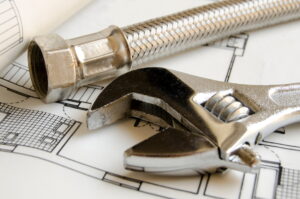We’ve all seen the aisle at the hardware store, full of different plumbing materials. There are rigid copper pipes, PVC pipes, PEX pipes, and the list continues–but there’s one thing to be mentioned that is not like the others, and that’s flexible plumbing lines. These are the wire mesh pipes that can bend and form different shapes in your Cedar Rapids plumbing.
Flexible plumbing lines are usually what you’ll see under your sink or connecting your toilet to the water line. They’re perfect for these situations because they can bend into the exact configuration that might fit your bathroom toilet or kitchen sink, without needing to break apart your wall, floor, or other more sensitive and expensive parts of your house.
But don’t be fooled by the convenience and affordability of flexible plumbing lines, they’re not intended to be used for everything.
Drains, Sewer Lines, and More
Standard plumbing protocols dictate that a drain or sewer line should be made of rigid, smoothly lined pipes for a number of different reasons. These are going to be different from your run of the mill flexible pipe because of the fact that they’re smoother on the inside.
Flexible plumbing lines are great for water flow, but they’re not commonly accepted for drains. They’re hard to clean and they can’t form the powerful P-trap that allows for our sink drains to run without the influx of sewer gases.
Pipes that are more rigid can undergo a lot more drain cleaning methods than flexible pipes. It’s not recommended to use hydro jetting on flexible drain pipes, because what they gain in flexibility and convenience, they lack in structural integrity, which is vital for these kinds of cleaning methods.
Clogging and Cleaning
Not only do flexible pipes lack the rigidity required for certain cleaning methods, but they also clog more easily than smoothly lined pipes like copper or galvanized steel.
Flexible pipes have more nooks and crannies that can be exploited by clogging materials, which then means you’ll need to clean them more frequently. And if they can’t be properly cleaned, you might even have to replace them.
Longevity and Engineering
Don’t get us wrong, flexible pipes are a wonderful addition to your home–where they can benefit you the most. But don’t overengineer a problem that doesn’t exist!
Rigid pipelines like copper will last longer than flexible pipe lines, which means you won’t need to pay for their replacement as frequently. Rigid pipes can also endure slight pressure from a shifting home or furniture, at least more so than flexible pipes. This means that you’re just more likely to get better returns from these kinds of pipes than from flexible ones.
Style
Don’t forget to take into account the style and aesthetics of your home! Some people love the convenient utility of flexible pipelines, but others can’t stand their aesthetic. Since it’s your home, it’s up to you to decide what plumbing material works. Or, you can schedule an appointment with our team to get a professional opinion.
At Dalton Plumbing, Heating, Cooling, Electric and Fireplaces, Inc., your comfort is our promise! To set up an appointment in the Cedar Rapids area, give us a call at the number above, email customerservice@daltonphc.com or schedule an appointment online.

